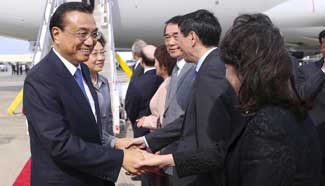by Zhou Shengping
KATHMANDU, Sept. 19 (Xinhua) -- Around 10 km away from the downtown area of Nepal's capital Kathmandu on Sunday morning, a special graduation ceremony was held at a temporary school whose previous buildings were completely destroyed by the devastating earthquake in 2015.
More than 50 teacher trainees, who completed a training program for nutrition, water, sanitization and garbage management, beamed with pride while sitting at simple desks in a rather crude classroom at the Balhodh Secondary School.
"I am very happy to attend this training program," said Raghunath Luitel, a 35-year old teacher.
"Our trainer taught us a great deal about food, water, personal hygiene and environment protection in a short period, which was very meaningful for us, as even though we do these things on a daily basis our trainer instructed us on how to do them correctly."
Gyanu Rimal, 45, another newly-qualified teacher expressed a similar view with Xinhua at the temporary school after receiving the certificate from Zou Zhiqiang, director of the Nepal office of the China Foundation for Poverty Alleviation (CFPA), one of the few international non-governmental organizations working outside of mainland China.
The female teacher said excitedly, "This training is very important and we learned many things. Now we know how to do these daily things correctly and we will now train our students what we have learned here in the same way to change society."
One hundred teachers, 150 students and 600 homemakers from three wards of Nagarjun Municipality, Kathmandu District comprised the trainees, according to Keshav Pokharel, the branch Chairman of the Safa Sunaulo Nepal, a local NGO and parter of CFPA that organized the training program from July to August this year.
As the main trainer, Top Bahadur Thapa, an assistant doctor from Aniko Society, the technical supporter of the program, is well aware of both unhygienic and unhealthy daily routines which are a result of a lack of understanding of the basic principles of sanitation and cleanliness.
According to the young social worker, without scientific knowledge and self-protection awareness, most of the citizens living in the area eat only for survival, not for health.
Homemakers do not wash their hands before cooking food and students are not aware of the need to wash their hands after defecating, Thapa observed.
In view the fact that washing hands can dramatically reduce the occurrence of diarrhea, respiratory diseases as well as the death of infants, a "six steps" procedure for proper hands washing is a compulsory part of the reeducation course.
"All the health-based knowledge I bestowed on these communities are new things for them, they are so simple, but very useful, " said Thapa, who witnessed many aged women listening to his lecture like pupils on their first day of school.
The data made public by Nepal's Ministry of Health and Population in 2012 showed that 54 percent of the country's 27 million population do not know how to wash their hands properly with soap and water.
On the first anniversary of the 2015 earthquake this April, the leading NGO CFPA issued a statement to the media in Kathmandu, saying it will invest about 180,000 U.S. dollars in hepatitis prevention and control, and water sanitation and health promotion programs, which will directly benefit 50,000 Nepalis.
Chairman Pokharel told Xinhua that the CFPA had also provided money to repair two damaged public toilets and build a new larger one since last year's earthquakes destroyed around half of the washrooms in this area. A few thousand people will enjoy the new facilities funded by the Chinese NGO.
Pokharel further said these days, programs supported by the CFPA had become a crowd puller and quite a catch in the Nagarjun Municipality.
All 14 wards of this municipality, home to over 100,000 people, expressed a strong willingness to implement similar training plans.
In August, 2015, the China Foundation for Poverty Alleviation registered its Nepal office with the Social Welfare Council (SWC), a government body under the Ministry of Women, Children and Social Welfare.
The ministry is responsible for the co-ordination, monitoring and evaluation of activities of NGOs in Nepal, and the CFPA signed a general agreement to work in areas of health, education and community development in Nepal.
The Himalayan nation is one of the least developed countries in the world and according to the latest report by the World Bank, its poverty rate stands at 25 percent.
Rakesh Himal, an executive member of the SWC thinks that the Chinese NGO's efforts here deserve a medal. According to him, the CFPA representatives came here taking responsibility for the edification of local people and were always true to their word.
"We all pulled together. They have won the hearts of the local people and I loved working with them," Himal said with a smile.










